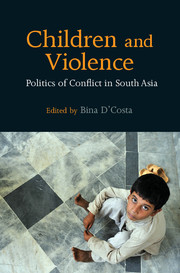Book contents
- Frontmatter
- Dedication
- Contents
- List of Map, Figures and Tables
- Acknowledgements
- Introduction: ‘Turtles Can Fly’: Vicarious Terror and the Child in South Asia
- Part I Shaping Childhood in South Asia
- Part II Conflict and Violent Peace
- Part III Rights, Needs and Protection
- Part IV Reflections from Human Rights Advocates in the Region
- Bibliography
- Notes on Contributors
- Index
Part I - Shaping Childhood in South Asia
Published online by Cambridge University Press: 05 June 2016
- Frontmatter
- Dedication
- Contents
- List of Map, Figures and Tables
- Acknowledgements
- Introduction: ‘Turtles Can Fly’: Vicarious Terror and the Child in South Asia
- Part I Shaping Childhood in South Asia
- Part II Conflict and Violent Peace
- Part III Rights, Needs and Protection
- Part IV Reflections from Human Rights Advocates in the Region
- Bibliography
- Notes on Contributors
- Index
Summary
The first part of this volume explores the conceptualization of childhood. The authors explore whether there is a global language of children's rights that permeates through the local/state-based settings to their communities and families. Duncan McDuie-Ra, Elora Chowdhury and Syed Sami Raza examine if this is the case when social/cultural orders are deeply, and in many cases perpetually, transformed due to political violence. Reviewing the history and representations of childhood, this part of the volume illustrates that, while these discussions and debates have continued for much longer, it was only in the second half of the twentieth century that they shifted from a language of ‘salvation’ to substantive protection of children's rights in the region.
In Chapter 1, Children and Civil Society in South Asia: Subjects, Participants, and Political Agents, Duncan McDuie-Ra analyses the relationships between children and civil society in South Asia. In South Asia the concept of childhood is contingent, contested, and uneven. Notions of what constitutes childhood and the capabilities of children can vary dramatically between and within local contexts, especially along class, caste, and ethnic lines. Despite the unevenness, children throughout the region work, study, fight, parent, migrate, consume, and play. Yet are they capable of acting politically? McDuie-Ra analyses three main relationships between children and civil society: children as subjects, children as participants, and children as political agents. A key argument in this chapter is that children are seen as legitimate agents in certain realms of civil society. These are formal, concerned with easily identifiable ‘children's issues’, and depend upon symbols of imagery and childhood to mobilize funding and support. When children participate in other realms: informal, associated with ‘adult issues’ and are dependent on other symbols and images, their sincerity and legitimacy is questioned. When children participate in the latter they are seen as coerced or manipulated, whereas when they participate in the former they are seen as a legitimate resource to guide advocacy and policy. Yet such an approach overlooks children's everyday political acts and forms of political awareness and knowledge inside and outside formal civil society actors.
- Type
- Chapter
- Information
- Children and ViolencePolitics of Conflict in South Asia, pp. 43 - 45Publisher: Cambridge University PressPrint publication year: 2016



